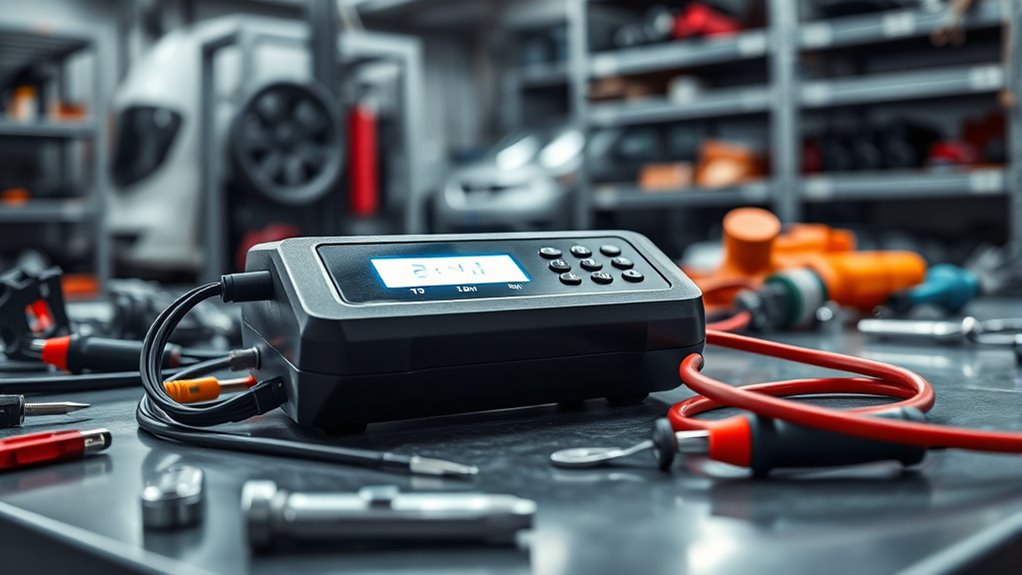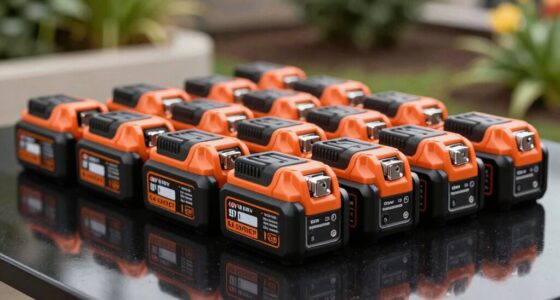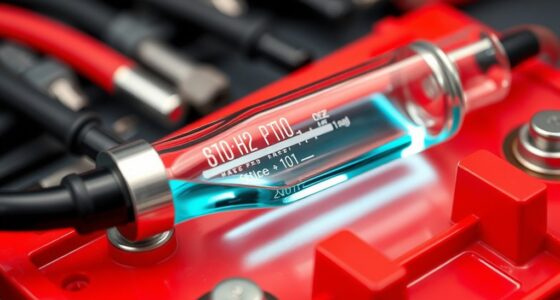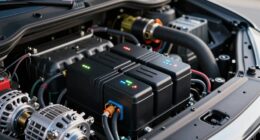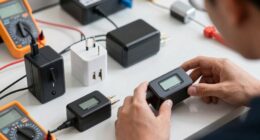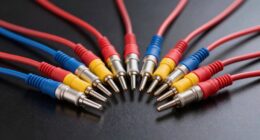If you’re looking for reliable and accurate car battery testers in 2025, I’ve found some top options like the AUTOPHIX BAS100, TOPDON BT100, ANCEL BA101, and FOXWELL models that suit different needs. These tools are easy to use, support various battery types, and provide quick diagnostics for health, capacity, and charging systems. Keep an eye on features like compatibility, safety, and user-friendliness—if you continue exploring, you’ll find the perfect match for your vehicle.
Key Takeaways
- Look for testers supporting 12V/24V batteries with high CCA capacity for versatile vehicle compatibility.
- Prioritize models with advanced AI or conductance technology for fast, accurate diagnostics.
- Ensure devices feature clear displays, color indicators, and user-friendly interfaces for easy interpretation.
- Check safety features like reverse polarity protection and spark-proof clamps for reliable testing.
- Consider additional functions such as alternator testing, engine diagnostics, and report printing for comprehensive analysis.
AUTOPHIX BAS100 Car Battery Tester

If you’re looking for a reliable and easy-to-use battery tester that can handle various vehicle types, the AUTOPHIX BAS100 is an excellent choice. It quickly assesses battery health and diagnoses starting or charging issues across cars, motorcycles, boats, and more. Supporting 12V and 24V batteries with capacities from 100 to 2000 CCA, it covers most common battery types like flooded, AGM, GEL, and EFB. Its high-conductivity copper clamps ensure solid connections, while the advanced AI chip provides near-perfect accuracy. Designed for simplicity, it offers clear results via a straightforward LCD, making it perfect for both beginners and experienced users.
Best For: DIY car and vehicle owners, mechanics, and boaters seeking a reliable, easy-to-use tool for quick battery diagnostics across various vehicle types.
Pros:
- Supports multiple vehicle types and battery configurations with high accuracy
- Durable construction with industrial-grade ABS housing and safety protections
- User-friendly with clear LCD display and straightforward operation
Cons:
- Not compatible with 6V/8V or lithium batteries
- Limited to 12V and 24V batteries within specified capacity ranges
- Requires physical connection to the battery, which may be challenging in tight spaces
TOPDON BT100 Car Battery Tester (12V Load Tester, 100-2000 CCA)
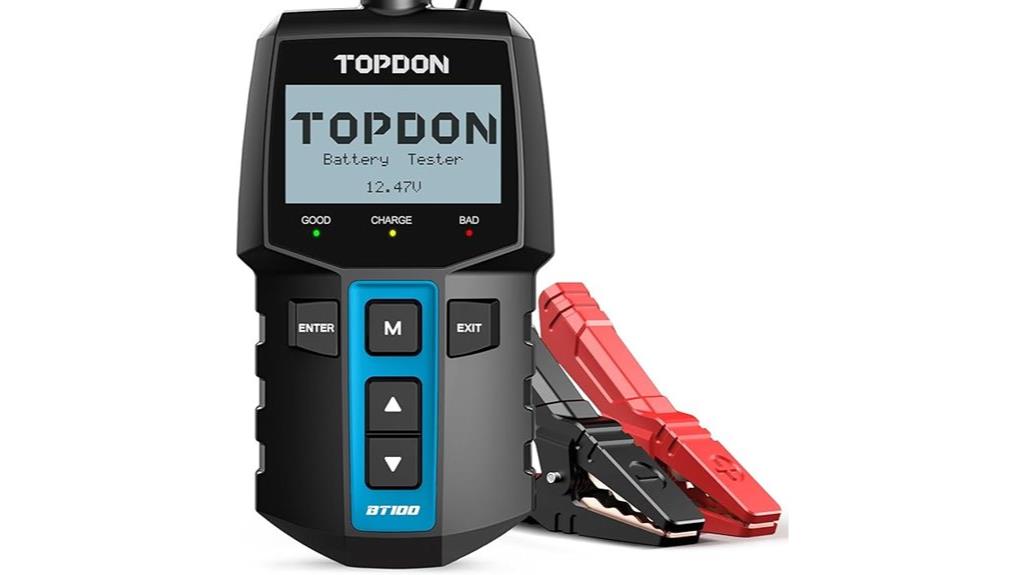
The TOPDON BT100 Car Battery Tester stands out as an ideal choice for automotive enthusiasts and professionals seeking quick, accurate diagnostics across a wide range of battery types. It supports testing 12V lead-acid batteries, including flooded, AGM, EFB, and GEL, with capacities from 100-2000 CCA. The device provides detailed data like SOH, SOC, voltage, and current, helping you assess battery health precisely. Its user-friendly interface, LED indicators, and safe, passive testing approach make it versatile for cars, trucks, boats, and more. Compact and portable, the BT100 delivers fast results, making it perfect for DIYers and professionals alike.
Best For: automotive enthusiasts, professional mechanics, and DIY car owners seeking quick, accurate battery diagnostics for a variety of lead-acid batteries.
Pros:
- Supports testing of multiple lead-acid battery types with clear, detailed analytical data.
- User-friendly interface with LED indicators and safe passive testing design.
- Compact, portable, and suitable for a wide range of vehicle types including cars, trucks, boats, and more.
Cons:
- Limited to 12V lead-acid batteries, not compatible with lithium or other battery chemistries.
- May require some familiarity with vehicle electrical systems for optimal use.
- Does not include advanced features like Bluetooth connectivity or smartphone integration.
ANCEL BA101 Car Battery Tester, 12V Digital Automotive Alternator Meter

The ANCEL BA101 Car Battery Tester stands out as an ideal choice for both professional technicians and car enthusiasts who need quick, accurate diagnostics without the hassle of complicated setups. This 12V digital tool supports a wide range of batteries, including Flooded, AGM, GEL, and EFB types, and performs extensive tests on battery health, voltage, and charging systems. Its intuitive interface, large LCD, and safety features make it easy to use and reliable. With a high accuracy rate of 99.6%, durable design, and multi-language support, the BA101 delivers fast, dependable results, making it a valuable addition to any vehicle maintenance toolkit.
Best For: DIY car owners, professional mechanics, and vehicle enthusiasts seeking quick, accurate battery diagnostics for various vehicle types.
Pros:
- Supports a wide range of battery types including Flooded, AGM, GEL, and EFB, ensuring versatility.
- High accuracy rate of 99.6% with advanced testing features for reliable results.
- User-friendly design with an intuitive interface, large LCD, and safety features for easy operation.
Cons:
- Excludes lithium, 6V, 8V, and 24V batteries, limiting some applications.
- Requires manual input of AH or CCA values for precise testing, which may be inconvenient for some users.
- Does not have a built-in rechargeable battery; operates solely from vehicle power.
TOPDON BT100 Car Battery Tester (Digital Auto Battery Analyzer)
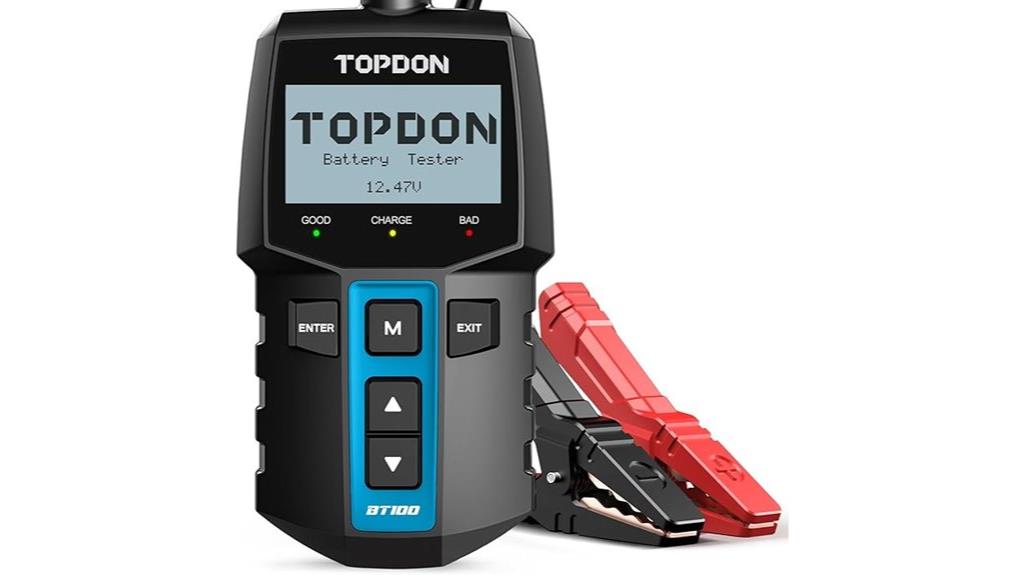
Designed for both DIY enthusiasts and professionals, the TOPDON BT100 Car Battery Tester stands out with its extensive analytical capabilities, making it an ideal choice for anyone who needs quick, accurate battery assessments. It tests 12V lead-acid batteries across various types, providing essential data like SOH, SOC, Voltage, Current, and Rating. Its safety features, such as passive testing and spark-proof clamps, ensure secure operation. Compact and user-friendly, the BT100 delivers rapid diagnostics for battery health, cranking ability, and charging system function. Whether in a shop or at home, it helps prevent roadside breakdowns and optimizes vehicle performance with reliable, detailed results.
Best For: DIY car owners, auto repair shops, and professional technicians seeking quick, accurate battery diagnostics for a variety of 12V lead-acid batteries.
Pros:
- Supports testing multiple lead-acid battery types with comprehensive analytical data including SOH and SOC.
- Safe and easy to use with passive testing, spark-proof clamps, and an intuitive interface.
- Compact, lightweight, and portable, ideal for use at home or in professional settings.
Cons:
- Limited to 12V lead-acid batteries; cannot test lithium or other battery chemistries.
- Requires proper attachment before powering on, which may be challenging in tight engine compartments.
- May not provide detailed diagnostics beyond basic battery health, cranking, and charging system checks.
ANCEL BA101 Car Battery Tester, 12V Digital Automotive Alternator Meter
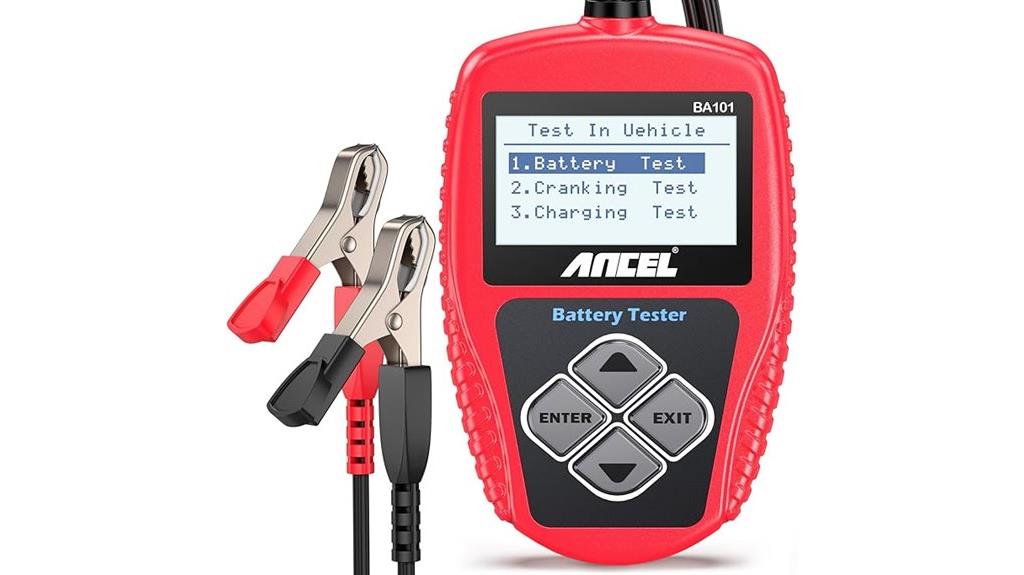
If you’re looking for a reliable and easy-to-use battery tester that delivers quick diagnostics, the ANCEL BA101 Car Battery Tester is an excellent choice. It supports various battery types like Flooded, AGM, GEL, and EFB, compatible with cars, trucks, boats, and RVs. The device measures battery health, voltage, and charge status, and performs cranking and alternator tests with 99.6% accuracy. Its intuitive interface, large LCD, and safety features make it user-friendly and durable. Perfect for both professionals and DIY enthusiasts, it provides extensive diagnostics without needing to be charged, making vehicle maintenance faster and more reliable.
Best For: DIY enthusiasts and professionals seeking quick, reliable diagnostics for a wide range of 12V vehicle batteries across cars, trucks, boats, and RVs.
Pros:
- Supports multiple battery types including Flooded, AGM, GEL, and EFB for versatile use.
- Offers high accuracy (99.6%) and comprehensive diagnostics like battery health, voltage, cranking, and alternator tests.
- Easy to operate with an intuitive interface, large LCD, and safety features, making it suitable for both beginners and experts.
Cons:
- Does not support lithium, 6V/8V/24V batteries, limiting its use to 12V systems only.
- Requires correct input of AH or CCA values for precise results, which may be challenging for some users.
- No rechargeable feature; it operates directly from the vehicle’s power, which might be inconvenient in certain situations.
Schumacher 100A Car Battery Load Tester and Voltmeter
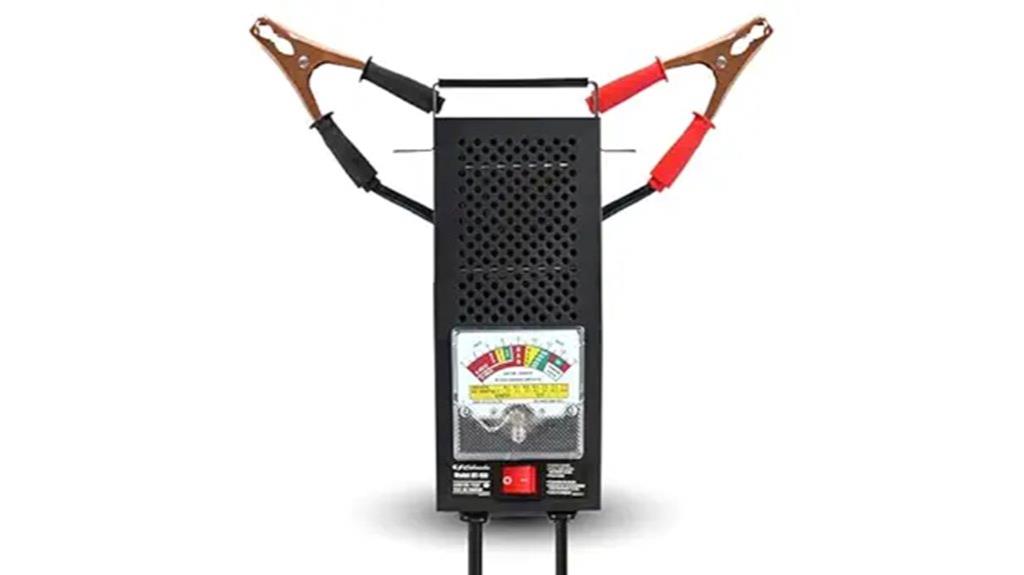
For those seeking a reliable and straightforward testing tool, the Schumacher 100A Car Battery Load Tester and Voltmeter stands out as an excellent choice. It’s designed for 6V and 12V batteries up to 1000 cranking amps, making it versatile for various vehicles like cars, boats, and ATVs. This device performs three essential tests—battery capacity, charging system, and starter motor—giving you a detailed view of your battery’s health. With a simple top-mounted switch and a clear meter face, it’s easy to operate and interpret results quickly. Overall, it’s a dependable, user-friendly tool for diagnosing electrical issues efficiently.
Best For: DIY vehicle owners, mechanics, and marine enthusiasts needing quick, reliable battery diagnostics for cars, boats, and ATVs.
Pros:
- Easy to operate with a top-mounted rocker switch and clear meter face.
- Performs comprehensive testing—battery, charging system, and starter motor—in one device.
- Compatible with 6V and 12V batteries up to 1000 cranking amps, suitable for various vehicle types.
Cons:
- May require some familiarity with vehicle electrical systems for accurate interpretation.
- Limited to testing batteries up to 1000 cranking amps, not suitable for larger industrial batteries.
- No digital readout; relies on analog meter which may be less precise for some users.
KONNWEI KW208 12V Car Battery Tester
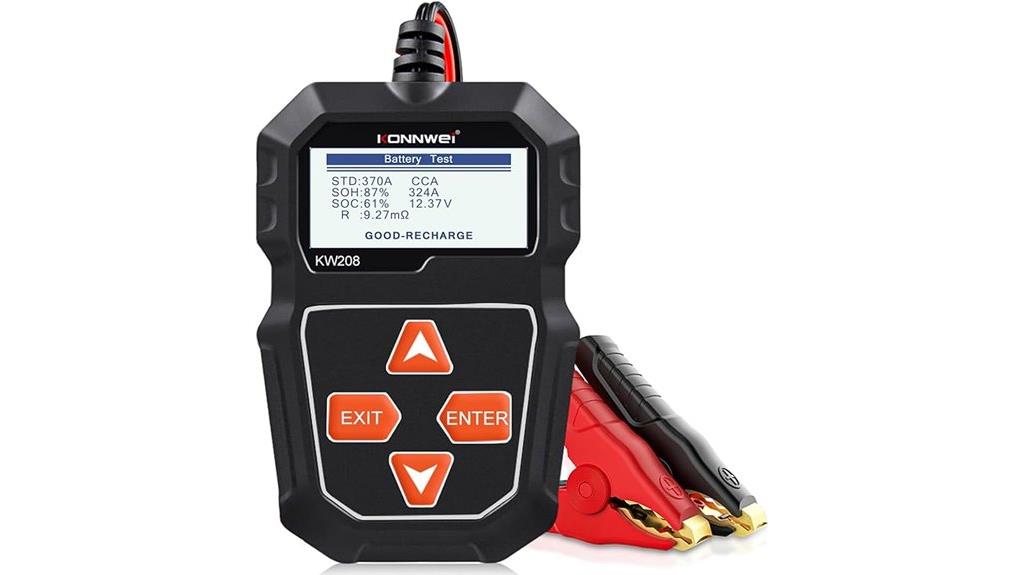
The KONNWEI KW208 12V Car Battery Tester stands out as an excellent choice for DIY enthusiasts and everyday drivers who want quick, accurate battery diagnostics without breaking the bank. It tests all 12V batteries, including flooded, AGM, gel, and spiral types, providing detailed data on health, voltage, internal resistance, CCA, and capacity. Powered directly from the vehicle, it’s portable and easy to use, delivering results within milliseconds thanks to its smart AI chip. Its durable alloy clips and plug-and-play design make testing straightforward—whether at the battery or in-vehicle—making it a reliable tool for routine maintenance and troubleshooting.
Best For: DIY enthusiasts and everyday drivers seeking an affordable, quick, and accurate solution for routine 12V car battery diagnostics and maintenance.
Pros:
- Provides fast, highly accurate testing results within milliseconds thanks to its smart AI chip.
- Compatible with all 12V battery types, including flooded, AGM, gel, and spiral, making it versatile.
- Compact, portable, and easy to use with a plug-and-play design, suitable for in-vehicle or remote testing.
Cons:
- Manual may be limited with small font and minimal instructions, which could complicate setup for some users.
- Accuracy depends on correct input of battery type and CCA, requiring user awareness.
- Less reliable at very low temperatures, potentially affecting test results in cold environments.
TOPDON BT200 Car Battery and Alternator Tester (24V/12V)
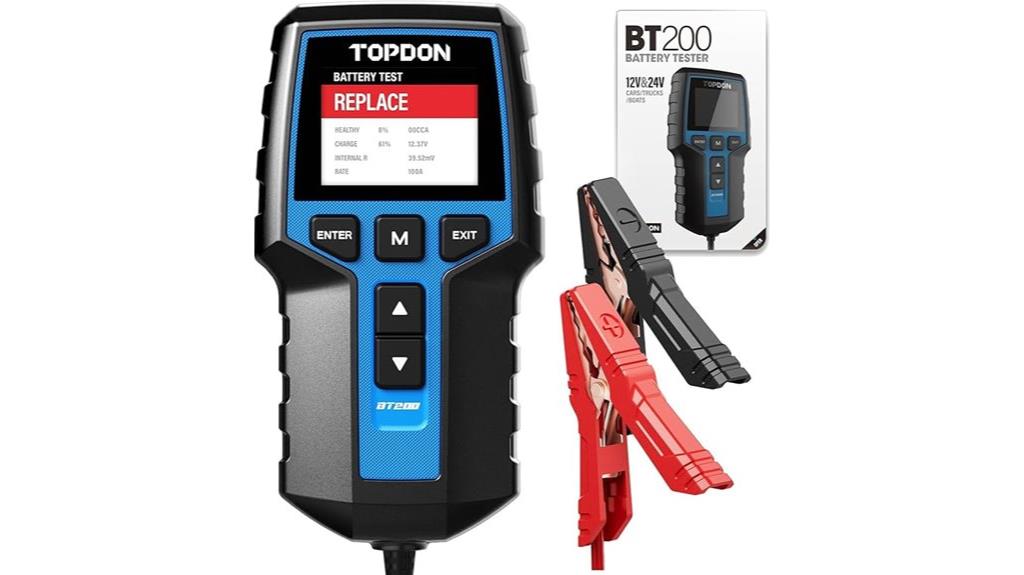
The TOPDON BT200 Car Battery and Alternator Tester stands out as an ideal choice for both professional mechanics and auto enthusiasts who need quick, accurate diagnostics of 12V and 24V batteries. It supports a wide range of battery types, including flooded, AGM, GEL, and deep cycle, making it versatile for various vehicles like cars, trucks, boats, and RVs. With advanced conductance technology, it delivers precise results in seconds, evaluating battery health, starter cranking, and charging status. Its compact design and clear 2.4-inch color display make it easy to use on the go, providing reliable insights without visiting a repair shop.
Best For: DIY auto enthusiasts, professional mechanics, and vehicle owners seeking quick, accurate diagnostics for 12V and 24V batteries across various vehicle types.
Pros:
- Supports a wide range of battery types including flooded, AGM, GEL, and deep cycle batteries.
- Uses advanced conductance technology for fast and precise testing results.
- Compact, portable design with a clear 2.4-inch color LCD for easy operation and readability.
Cons:
- May require familiarity with battery testing procedures for optimal use.
- Limited to battery and alternator testing; cannot perform more in-depth electrical system diagnostics.
- Customer support is limited to US phone service hours, which might not be sufficient for international users.
MOTOPOWER 12V Digital Car Battery Tester with LCD Display
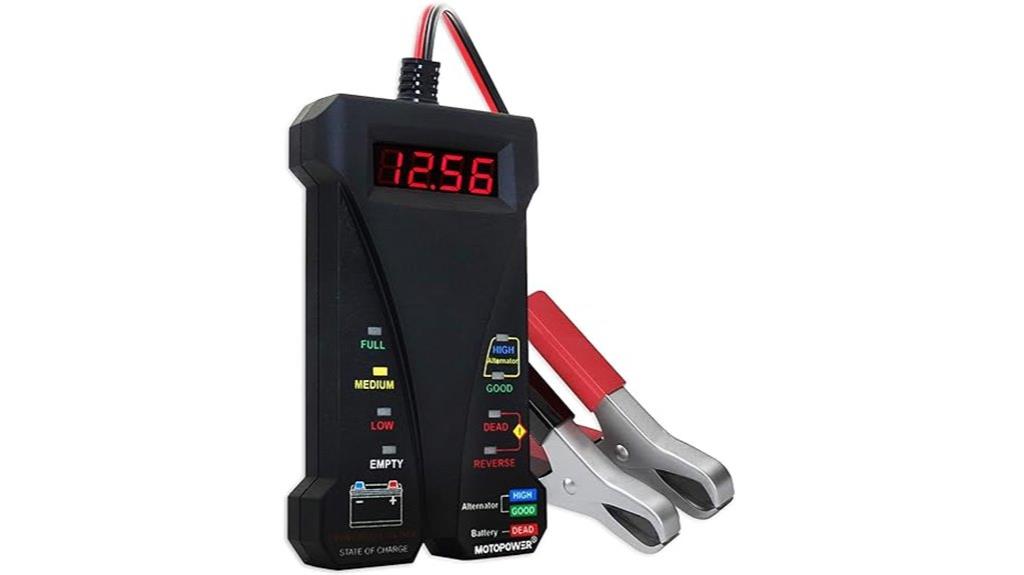
If you’re looking for an easy-to-use, reliable tester that provides quick and accurate readings, the MOTOPOWER 12V Digital Car Battery Tester with LCD Display is an excellent choice. Its plug-and-test design makes setup simple—just connect it to your battery to check voltage before starting and to test the alternator afterward. Weighing only 150 grams with a comfortable grip, it’s portable and perfect for emergencies or professionals. Safety features like reverse connection and over-voltage protection help prevent damage and guarantee safe operation. The clear 4-digit LCD and colored LEDs provide precise, intuitive diagnostics, making it an essential tool for maintaining your vehicle’s electrical health.
Best For: vehicle owners, professional mechanics, and emergency responders seeking a quick, reliable, and easy-to-use battery testing tool.
Pros:
- Simple plug-and-test design for effortless operation without complex setup
- Accurate 4-digit LCD display with 0.01V measurement precision
- Safety features like reverse connection and over-voltage protection enhance user safety
Cons:
- Limited voltage detection range (4 to 20V DC) may not suit all battery types
- Dependence on extension cable and alligator clips could be inconvenient in tight spaces
- Compact size may require careful handling to avoid accidental drops or damage
TE503 Car Battery Tester (6V/12V/24V, 100-2000 CCA)
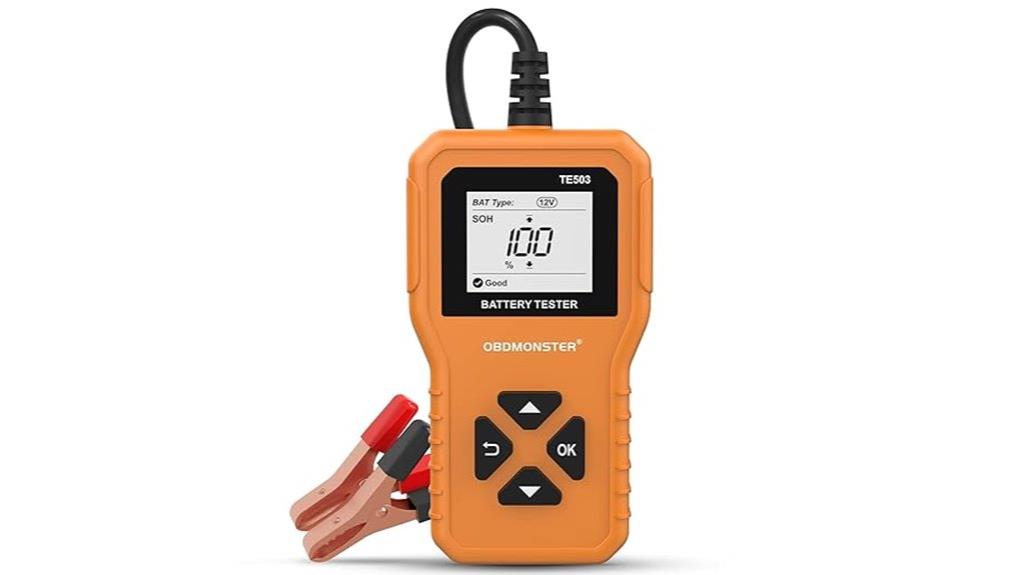
Designed for both beginners and professionals, the TE503 Car Battery Tester offers fast, accurate readings across multiple battery types and voltages. It supports 6V, 12V, and 24V batteries with a CCA range of 100-2000, suitable for cars, boats, motorcycles, and more. The tester provides detailed data on resistance, voltage, health, charge, and CCA, with clear assessments like good or poor. Its user-friendly interface features a large LCD display with backlight, making testing straightforward whether in or out of the vehicle. Reverse connection protection and load testing enhance safety and reliability, making it a versatile and valuable diagnostic tool.
Best For: DIY car owners, fleet managers, and automotive enthusiasts seeking a reliable, easy-to-use battery testing device for various vehicle types and battery conditions.
Pros:
- Supports multiple battery types and voltages (6V/12V/24V) with a wide CCA range (100-2000)
- Provides comprehensive battery data including resistance, voltage, health, charge, and CCA with clear assessments
- Compact and easy to operate with a large LCD display and user-friendly interface
Cons:
- Voltage readings may be less accurate without applying a load during testing
- CCA scale may lack fine precision, with 5A increments limiting detailed analysis
- Some users have reported discrepancies in battery capacity readings or limitations in measurement accuracy
Car Battery Tester (BT500) for Automotive Charging and Cranking Systems

Anyone looking for a reliable, all-in-one battery tester that’s easy to use and highly precise will find the BT500 an excellent choice. This versatile device tests 6V, 12V, and 24V batteries, supporting ratings from 5-3000 CCA, and works with flooded, AGM, GEL, and EFB batteries across cars, trucks, motorcycles, RVs, and boats. It measures voltage, internal resistance, CCA, and overall health, helping you identify weak or overcharged batteries. The large LCD display offers clear results, and safety features like reverse polarity protection guarantee secure operation. Compact and durable, the BT500 is perfect for both DIYers and professionals alike.
Best For: DIY enthusiasts and automotive professionals seeking a reliable, accurate, and easy-to-use battery tester for various vehicle types and battery chemistries.
Pros:
- Supports testing of 6V, 12V, and 24V batteries with ratings from 5-3000 CCA, suitable for a wide range of vehicles and equipment.
- Provides comprehensive battery analysis including voltage, internal resistance, CCA, SOH, and SOC for accurate health assessment.
- Equipped with safety features such as reverse polarity protection and a durable build for reliable performance in different environments.
Cons:
- Does not include a carrying case or touchscreen interface, which may affect portability and user experience.
- Not compatible with lithium batteries, limiting its use with some modern battery types.
- Requires manual setup and interpretation, which might be challenging for complete beginners without prior knowledge.
ANCEL BST200 Car Battery Tester for 12V Vehicles
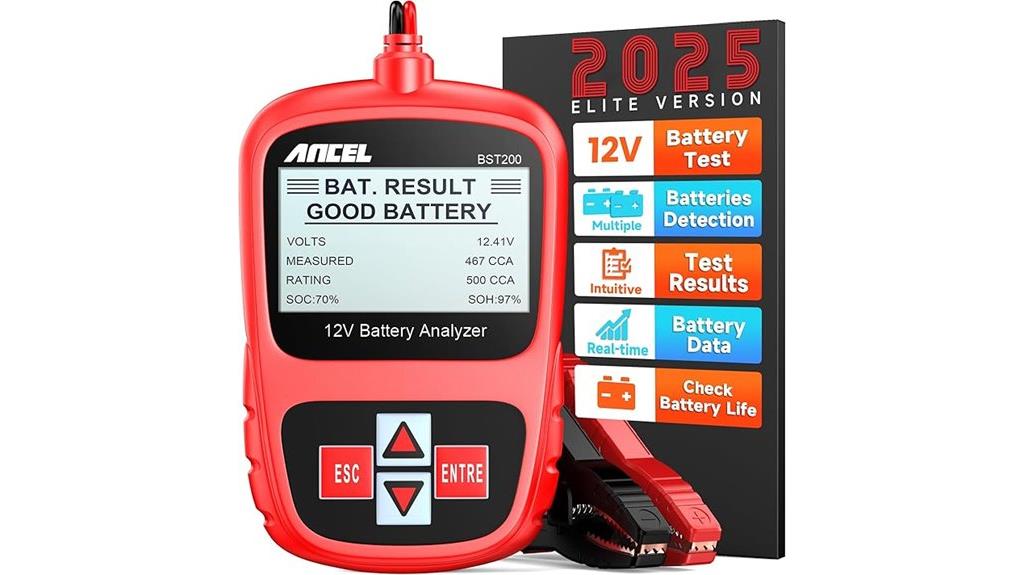
The ANCEL BST200 Car Battery Tester stands out as an ideal choice for DIY enthusiasts and car owners seeking quick, accurate diagnostics for 12V lead-acid batteries. It’s compatible with various battery types, including flooded, AGM, GEL, and more, suitable for cars, trucks, motorcycles, boats, and RVs. The device delivers results in seconds, measuring parameters like CCA, voltage, internal resistance, and health status. Its compact, lightweight design makes it portable and easy to use anywhere. With a simple interface and clear recommendations, it helps users make informed maintenance decisions, preventing breakdowns and extending battery life effortlessly.
Best For: DIY enthusiasts, car owners, and maintenance professionals seeking quick, reliable diagnostics for 12V lead-acid batteries across various vehicle types.
Pros:
- Provides fast, accurate battery health and load testing results within seconds.
- Compatible with multiple battery types and vehicle applications, including boats and RVs.
- Compact, lightweight, and easy to operate with a simple interface suitable for all users.
Cons:
- Limited to 12V lead-acid batteries; not suitable for lithium or other advanced battery types.
- Requires proper connection to battery terminals; improper connections can affect results.
- May need to be used in a temperature-controlled environment for optimal accuracy.
FOXWELL NT301 Plus 2-in-1 OBD2 Scanner and Battery Tester

If you’re looking for a versatile diagnostic tool that combines engine troubleshooting with battery testing, the FOXWELL NT301 Plus is an excellent choice. It seamlessly integrates full OBD2 diagnostics with a professional-grade battery analyzer, giving you quick access to check engine codes, live data, and battery health metrics like CCA and SOH. The device supports multiple vehicle protocols from 1996 onward and features a user-friendly 2.8-inch color display with alerts and graphical data. Its real-time monitoring, reporting capabilities, and free lifetime updates make it perfect for both DIY enthusiasts and professionals seeking reliable, all-in-one diagnostics.
Best For: DIY enthusiasts and professional mechanics seeking an all-in-one diagnostic tool for engine troubleshooting and battery health assessment.
Pros:
- Combines full OBD2 diagnostics with professional-grade battery testing in one device.
- Supports a wide range of vehicle protocols from 1996+ and provides real-time data, graphs, and report printing.
- User-friendly with a large color display, instant alerts, and free lifetime software updates.
Cons:
- Not compatible with non-OBDII vehicles, some pre-1996 models, or certain brands like Fiat and Peugeot.
- May require additional connectors for specific protocols or vehicle makes.
- Limited to vehicles with standard 16-pin OBDII ports; incompatible with some specialty or older systems.
FOXWELL BT705 Car Battery Tester
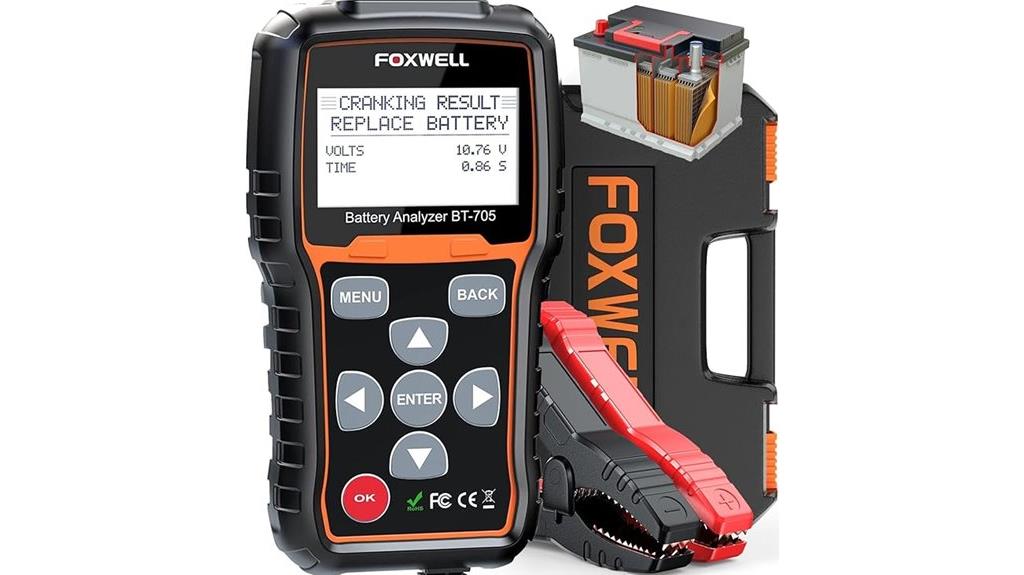
Designed for both professionals and DIY enthusiasts, the FOXWELL BT705 Car Battery Tester stands out with its extensive analysis features and user-friendly design. It tests 12V and 24V systems across various battery types, including flooded, AGM, spiral, and GEL batteries, with 99.9% accuracy. The device offers detailed insights like SOH, SOC, cranking voltage, and alternator output, helping prevent surprises. Its large 2.8-inch LCD display ensures clear readings, even in bright light. With a 5.9-foot cable and simple operation, you can test solo. Backed by over 14 years of expertise, the BT705 provides reliable diagnostics for a wide range of vehicles and equipment.
Best For: automotive professionals and DIY enthusiasts seeking a reliable, comprehensive battery testing solution for a variety of vehicles and battery types.
Pros:
- Provides highly accurate 99.9% battery and alternator testing results across multiple vehicle types.
- Features an easy-to-read 2.8-inch LCD display with straightforward operation, suitable for solo use.
- Supports testing of a wide range of batteries including flooded, AGM, spiral, and GEL, for 12V and 24V systems.
Cons:
- Requires proper contact and setup inside the vehicle for optimal results, which may be challenging in tight spaces.
- Does not connect to smartphones or apps, limiting integration with digital diagnostics tools.
- The device’s size and cable length may be less convenient for testing in very confined or hard-to-reach areas.
Factors to Consider When Choosing a Car Battery Tester
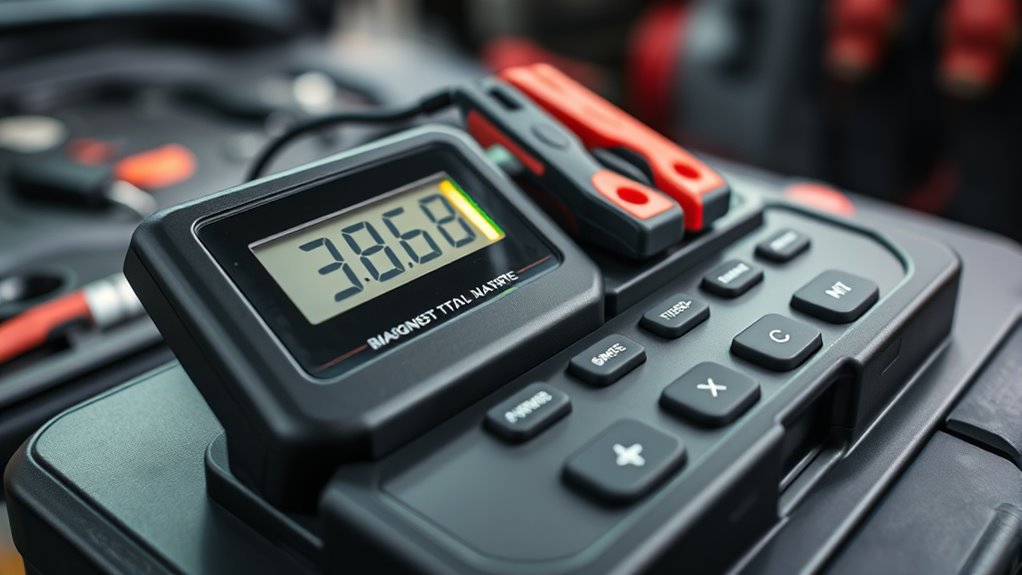
When choosing a car battery tester, I consider how well it works with different battery types and how accurate and reliable the readings are. I also look for models that are easy to operate, portable, and safe to use. By focusing on these factors, I guarantee I pick a tester that’s effective and convenient for my needs.
Compatibility With Battery Types
Choosing the right car battery tester means guaranteeing it supports your battery’s specific type and chemistry. First, check that it supports the voltage your vehicle uses—whether 6V, 12V, or 24V. Compatibility with your battery’s chemistry is also vital; whether it’s flooded, AGM, GEL, or EFB, the tester must accurately read each type. Additionally, verify that the device can handle your battery’s capacity range, like CCA or Ah, for precise health assessment. Different batteries have standard ratings such as CA, MCA, JIS, DIN, SAE, or BCI, so guarantee the tester supports these standards relevant to your region. If you have specialty batteries, like marine or deep-cycle types, confirm that the tester can accommodate their specific requirements. Proper compatibility guarantees reliable, accurate testing results.
Testing Accuracy and Reliability
A car battery tester’s accuracy and reliability are essential because they directly impact the trustworthiness of the results you receive. I look for testers that deliver consistent results with minimal variance across multiple tests, ensuring dependable assessments. High-accuracy models use advanced conductance or load testing technology that simulates real-world conditions, providing a more precise picture of battery health. The device should display detailed parameters like CCA, voltage, and internal resistance, which are crucial for accurate diagnosis. A good tester correctly identifies batteries that are nearing failure or still in good condition, minimizing false positives or negatives. Additionally, calibration and adherence to industry standards are critical for maintaining reliable results over time, giving me confidence in the tool’s long-term performance.
Ease of Use Features
Ease of use is essential because a battery tester should make the testing process quick and straightforward. I look for models with clear, easy-to-read displays, like LCD screens with backlighting, so I can see results in any lighting. Simple operation is a must—plug-and-play or minimal button presses save time and effort. I prefer testers with secure, easy-to-attach connection mechanisms, such as alligator clips or copper clamps, that don’t require special tools. An intuitive interface with clearly labeled buttons and menus helps both beginners and experienced users navigate the device effortlessly. Finally, I want immediate, easy-to-understand feedback—color-coded indicators or straightforward numerical results—that quickly tell me my battery’s health without confusion. These features ensure testing is hassle-free and accurate.
Portability and Size
When selecting a car battery tester, its size and portability can considerably impact how and when I use it. A compact design makes it easy to store in my glove compartment or toolkit, so I can carry it for quick checks anytime. Lightweight models, often under 200 grams, reduce fatigue during frequent testing or extended use. Smaller testers are usually powered by the vehicle’s battery or internal batteries, eliminating the need for external power sources. Plus, their size allows me to operate them with one hand, even in tight or awkward spaces. Overall, a portable, compact tester is more durable and designed to withstand rough handling and frequent transport, making it a practical choice for both professional technicians and everyday car owners.
Safety and Protection
Choosing a car battery tester with strong safety features is vital to protect both myself and my vehicle. Reliable testers include protections like reverse polarity, over-voltage, and over-current safeguards to prevent damage and guarantee my safety. Advanced models add layers of security, such as spark-proof clamps and insulation, reducing risks during testing. Temperature protection is essential for accurate readings in extreme conditions, avoiding false results caused by cold or hot environments. Automatic shut-off and overload protection help prevent accidental damage to the tester and my vehicle’s electrical system. Proper safety features not only keep me safe but also ensure I get precise, dependable diagnostic data. Prioritizing these protections makes the testing process safer and more reliable.
Diagnostic Capabilities
To guarantee a car battery tester provides thorough insights, I look for models that accurately measure key parameters like the battery’s State of Health (SOH), State of Charge (SOC), and Cold Cranking Amps (CCA). These measurements reveal the battery’s overall condition and ability to start the vehicle reliably. Good diagnostic capabilities also include testing the charging system and alternator, helping identify issues early and prevent breakdowns. Load testing is essential, as it simulates real-world conditions to verify the battery’s power delivery under stress. Advanced testers can distinguish between battery problems and electrical system issues, offering extensive insights. High-accuracy, real-time analysis—over 99.6%—ensures dependable results, making diagnostics more precise and actionable.
Price and Warranty
Price and warranty are crucial factors that can considerably influence your overall satisfaction with a car battery tester. Higher-priced models often come with advanced features, better accuracy, and longer-lasting build quality, offering more value over time. Conversely, budget-friendly testers may have limited functionality or lower durability, but some still provide solid performance with basic warranties. It’s necessary to check what the warranty covers—whether parts, labor, or both—and if it includes free replacements or repairs for defects. A longer warranty, typically 2-3 years, suggests greater confidence in the product’s durability and reliability. Investing in a model with extensive warranty coverage can save you money on repairs or replacements if the device malfunctions prematurely, making it a smart long-term choice.
Frequently Asked Questions
How Often Should I Test My Car Battery for Optimal Performance?
I recommend testing your car battery at least every three to six months to guarantee it’s performing at its best. If you drive often or live in extreme weather conditions, more frequent checks, like monthly, can catch issues early. Regular testing helps prevent unexpected breakdowns and keeps your vehicle running smoothly. Using a reliable tester makes the process quick and accurate, giving you peace of mind on the road.
Can Car Battery Testers Diagnose All Types of Battery Issues?
Sure, a good car battery tester can spot many issues, but it’s not a magic wand. It mainly checks the battery’s health and starting power, not every problem like internal damage or corrosion. Think of it as a quick health check-up, not a full body scan. So, while it’s helpful, don’t expect it to diagnose every quirky noise or mysterious malfunction under the hood.
Are There Portable Car Battery Testers Suitable for On-The-Go Use?
Absolutely, there are portable car battery testers perfect for on-the-go use. I’ve used compact models that easily fit in my glove box or toolkit, making it simple to check my battery’s health anytime, anywhere. These testers are lightweight, user-friendly, and give quick, accurate readings. Whether I’m at the roadside or in my garage, I trust these portable devices to help me diagnose battery issues on the spot efficiently.
How Do Temperature Changes Affect Battery Testing Accuracy?
Imagine your car’s battery as a swimmer battling the cold or heat; temperature swings can slow or speed up its performance. When testing, cold reduces the battery’s ability to deliver current, making it seem weaker, while heat can give a false sense of strength. I’ve learned that conducting tests in stable, moderate temperatures yields the most accurate results, ensuring I don’t misjudge my battery’s health.
What Safety Precautions Should I Follow When Testing a Car Battery?
When testing a car battery, I always wear gloves and safety glasses to protect myself from acid splashes and sparks. I make sure the vehicle is off and the parking brake is engaged. I avoid touching the terminals directly and double-check the tester’s connections. Working in a well-ventilated area, I keep a fire extinguisher nearby just in case. Safety always comes first to prevent accidents.
Conclusion
Choosing the right car battery tester is like finding the perfect compass for your journey—essential for staying on course. With so many reliable options out there, you can confidently navigate any battery issue before it leaves you stranded. Think of these tools as your trusty sidekick, always ready to shine a light on the problem. Equip yourself wisely, and you’ll keep your vehicle running smoothly, no matter where the road takes you.

